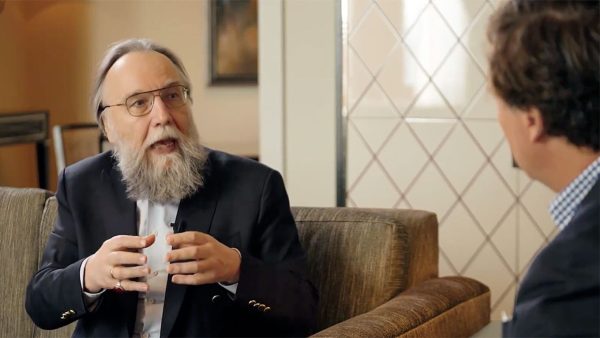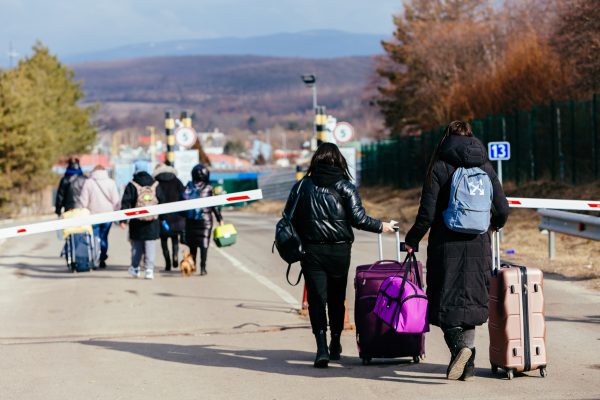Sam Greene: Hello and welcome to the Center for European Policy Analysis and the 2023 CEPA Forum. My name is Sam Greene. I’m the director of the Democratic Resilience Program at CEPA. The theme of this year’s forum is Winning the War, Winning the Peace. And it’s that second front that brings me today to St. Louis here to the headquarters of Bayer in St. Louis, and to today’s conversation with Rodrigo Santos. Trained as an agricultural engineer in Brazil, Rodrigo has worked in Latin America, Africa, Europe, North America, and now globally as chief executive of Bayer crop science, and joins me today for this conversation about the future of Ukrainian agriculture, global food security and the role of the international private sector in winning the peace. Thank you, Rodrigo, for being both our host and our guest today, here in St. Louis.
Rodrigo Santos: Well, thank you, Sam, for visiting us here to have this important conversation, especially on this site, we do a lot of the innovation and science that we apply for the farmers in Ukraine and globally, coming out of here. So it’s a great opportunity to talk a little bit about that.
Greene: Well, so let’s get into it. I think a lot of us have this idea on the tip of our tongue of Ukraine as a breadbasket of Europe, of the world to a certain extent, but I’m not sure that we all understand exactly what that means. Can you enlighten us a little bit about, you know, the role that Ukraine plays in the global food system and why it’s so important to get Ukrainian agriculture, and agricultural exports, up and running again, as quickly and efficiently as possible?
Santos: Before I share some of the numbers on that one that I think will highlight the importance of Ukraine; I had the opportunity to be in Ukraine visiting farmers many times and the power of that sector, because of the soils and the technologies that farmers apply and how they are really driven by technology, is so relevant. But before the numbers, I was recently visiting Africa, so I was in Africa. And if you think about the importance or the impact of the war, it’s when you visit Africa or the Middle East. Why is that? Because in Ukraine, Ukraine is responsible for 15 to 20% of the global corn exports, and 10 to 15% of the global wheat exports, especially for those markets. So that’s the relevance. That’s the relevance: the food system is all interconnected. When you have an impact like that, it’s not an impact only in Ukraine or the middle east of Europe, but also in Africa, and the Middle East. So that’s the relevance of that area.
Greene: You mentioned the Ukrainian farms that you’ve visited. Now, we’ve all seen the pictures since this war began over the last 18 months of the damage done to Ukrainian farms by the Russian invasion; of the damage done to grain silos; export infrastructure; we see and we read about the blockade of export routes in the Black Sea. What’s your assessment of the scale of the damage that this war has done, and I guess then the scale of the task for reconstruction and recovery?
Santos: It’s a huge damage; it’s really an aggression that is impacting the farmers, impacting the entire society, but even also outside of Ukraine, right, as we were talking, I initially thought that the biggest impact would be on the first year. But we see even a bigger impact this year, on the second year of the war, because of the impositions of stopping the exports, or the Black Sea agreements not being clearly all the time, you have an impact of that one. And that also led to the farmers in Ukraine having a big impact on profitability, especially because of logistics, the main impact for them today by far is logistics. They cannot export to other ways at a higher cost than they have. And this has a little bit led to a reduction in corn area by almost 30-40% because of that, and this is a huge impact. And this is the direct impact. You have other impacts like the mines on farmers’ fields, that’s another one that will stay longer. And we’re going to work on that one. But the impact of the war was significant in the first year and even bigger this year in the second year of [the war].
Greene: We’ve seen various estimates right, of the scale of reconstruction, the cost of reconstruction, people have talked about figures, not just in agriculture, obviously, but you’re talking about Ukrainian industry, infrastructure, housing, energy, telecommunications, ranging from 300 billion to a trillion or more dollars. Clearly, governments are not going to be able to cover the entirety of that cost. There is a role that’s going to need to be played by the private sector. From your perspective, as somebody who has been invested and has been working with Ukraine, and is currently still looking at Ukraine: what’s the appropriate role for the private sector to play in this?
Santos: That’s a great question Sam, and it’s fair to say that the private sector will need to play a bigger role there as well. The government by itself, and I think this is the case, that we’re going to need the government, we’re going to need the NGOs, we’re going to need the private sector to play. We will do our side, so I’ll give an example that recently we just announced a big investment in Ukraine on our production side. 60 million euros that we’re going to invest in Ukraine to make the market and to develop the sector there as well to regain the leadership that we used to have there, and we need to have this country running agriculture as it should be. So this is a good example, we are working in different forms. I mentioned the mines; we donate close to 900,000 euros for one of the partners that we have that basically acquires a large machine, to skin mines in large fields of the farmers. That’s another example. We are working with the farmers; we donate to the farmers also seeds for this year. There are a lot of actions. And I’m trying to give examples of real actions that we need to put in place, all the private sector, to help that sector, it’s important for Ukrainian farmers, and it’s important for the country. 14% of the population is involved in agriculture, but 40% of the exports of that country are coming from agriculture, so for the economy, it is extremely relevant. So I feel that the private sector with clear actions will need to help and make a step on that one in that direction.
Greene: I mean, it’s really astounding that there is work that is being done now, even as the fighting continues, obviously, there’s going to be a lot more work that needs to be done down the road. There are conversations happening on a very regular basis involving governments, the private sector, international financial institutions, and civil society, both in Ukraine, and globally. Are you satisfied that governments, particularly Western governments, are doing what they need to and understand what they need to do to unlock the potential of larger investment from the private sector going forward?
Santos: I had the opportunity to meet the minister of agriculture from Ukraine, in Berlin. And we had a long conversation about what your question is about, right, what is needed, and the impact, like the logistics impact, a good example of that, that was a great debate that we had. I would say that we are going to need to do more. That would be my summary. First of all, you mentioned something in your question that I want to highlight; I was so impacted by the resilience of the farmers there. And from our organizations as well, we have 700 people from Bayer working every day in Ukraine and delivering seeds to the farmers and the inputs they need to produce. The resilience of that country is amazing. And the resilience of the farmers and our employees working with them every day is something quite unique. I was on a call with them, then suddenly they need to drop the call, they need to leave from the call, it was amazing to see that. But that’s just the beginning, we’re going to need to do more. And I feel that the government will need to bring the different sectors together, and how we take the actions that we were talking about to help the farmers. And I’m talking more about the [private sector], as you said, there’s all the other sectors, but this is such an important sector for the country, and they have this opportunity to really regain that position they had before the war.
Greene: Do you have a sense of a timescale? How quickly can Ukraine get back up to where it was or even beyond where it was? Ukrainians talk a lot about wanting to use this recovery as an opportunity not to simply rebuild what they had, right, but to build towards a better and more efficient sector in the future.
Santos: That’s a great question. One thing that for us, and I really hope that this war ends, as soon as possible, that’s something that we wish that if there is one thing that the global community should continue to pressure is to have an end of the war. That’s the first piece. And then the second piece will take time. And another element that you said is not only regaining the position, but how they can even advance, and recently we announced a partnership with the US government to do another investment in Ukraine that is a $50 million investment that also [aims] to develop the digital agriculture of the country so they can really have a higher position than they were before. In the end of the day, this will take years. It will take years, they will need to clean up, and they will need to regain the logistic component and the competitiveness of the sector. But I feel that everything is in place to not only take the position they had but as you said, to go even beyond, and one of the elements that we are doing is working there with the farmers to advance with a digital agriculture that I feel will be very helpful for them managing their fields in the future.
Greene: You’ve talked about significant investments. Again, even in the course of this war, I think just in the last five minutes, you’ve mentioned investments totaling somewhere in the range of 80 million; a lot more to come. What underpins Bayer’s strategic commitment, if I can call it that, to Ukraine?
Santos: That’s a reflection that we have. When we think about Bayer and agriculture, we have a very long reveal, right? And we are very impacted by the fact that when you think about FAO and United Nations numbers, they say, we’re going to need to produce 50% more food and feed for the growing population of 2050. We’re going to have 2.2 billion people more on this planet. And we’re going to need to produce again, 50% more food and feed that is produced today with less land. And we need to do that in a sustainable way. And this is why we need to advance on regenerative agriculture. And we need that sector to be receiving investment and to power the investment in terms of innovation and technology. And that’s why when you think about the amount that would challenge and as we said, the food system is globally connected. And we realize with a war that is fragile, we need every player to play an important role in this major equation. In the end of the day, our vision is that agriculture is not only part of the solution for this food production that I mentioned but also for climate change. And that’s why Ukraine as an important player of that sector needs to regain the position they had before the war.
Greene: So the world doesn’t eat without Ukraine, the world doesn’t tackle climate change without Ukraine. Any company that wants to be is what I hear you saying, any company that wants to be a part of the solution to those and other challenges needs to be looking seriously at Ukrainian reconstruction and recovery.
Santos: And Sam, I cannot emphasize more what you said. And recently, when I’m visiting this small farmer in Africa, and I’m traveling the countryside of Kenya. And this is when you take the conversation about food security so seriously, right? And it’s important that any government official that is sitting in different places, they are aware that the food system is a global food system that impacts Africa, Asia, and Latin America, where I’m coming from, not only the northern hemisphere, right? So that’s why the Black Sea agreement needs to be in place, we need to allow farmers to export grain outside of Ukraine, we need to help them to do that. So we need them and not “we” need but the farmers and the people of Africa and the Middle East. So that’s the relevance of Ukraine.
Greene: This is the conversation that we’re going to keep having over the weeks, months, and as you said, years to come. Thank you very much for your insight and the opportunity to get that conversation started with you today here at the Bayer headquarters in St. Louis. Thank you also to all of you for tuning into this conversation as part of the 2023 CEPA Forum, Winning the War, Winning the Peace. Please do click over to cepa.org for the full CEPA Forum agenda for forthcoming speakers and an archive of previous conversations, and follow us of course on social media with the #CEPAForum for up-to-date information on events and analysis. I’ve been Sam Greene with Rodrigo Santos here at Bayer in St. Louis. Until next time, thank you, and good luck.





